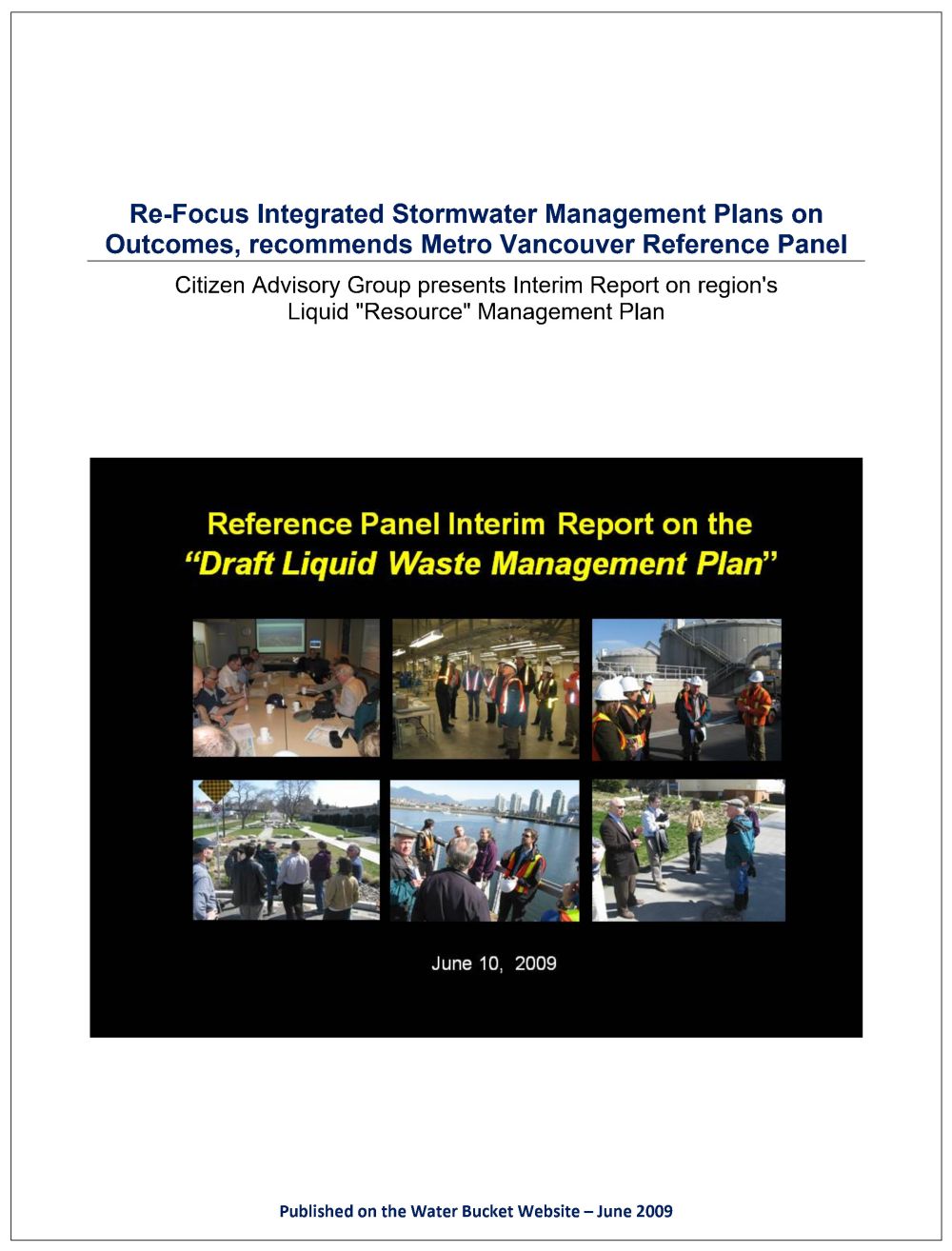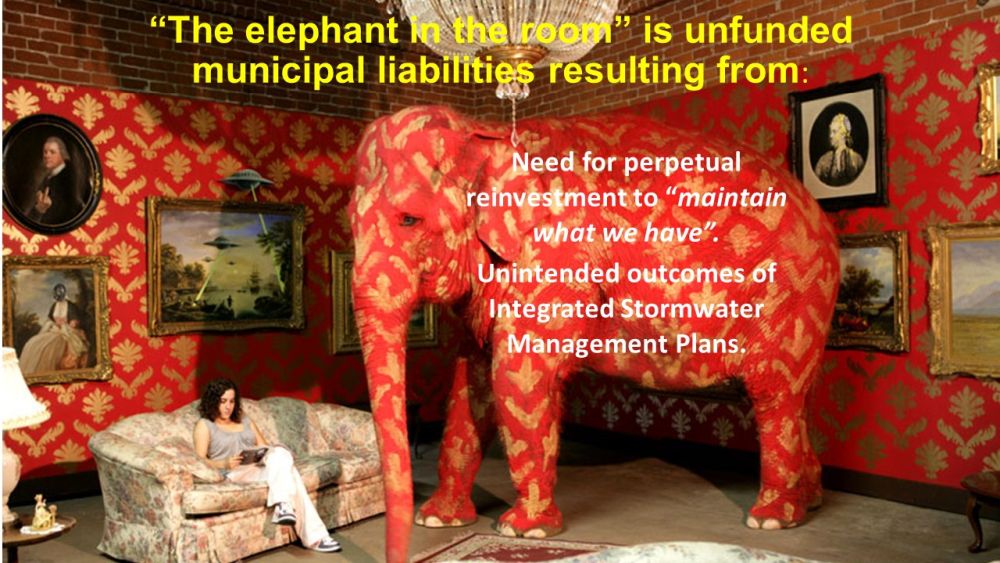FLASHBACK TO 2009: “To do an Integrated Stormwater Management Plan right, one has to start with the desired outcome – which is protect or improve stream health – and then determine what actions in the watershed will green the urban landscape,” stated Kim Stephens, Chair of Metro Vancouver’s Liquid Waste Management Reference Panel, when reporting out to regional elected representatives
Note to Reader:
Appointed by the Metro Vancouver Regional Board in April 2008 to provide independent advice and recommendations regarding the management of liquid wastes and rainwater, the Liquid Waste Management Reference Panel presented their Interim Report on A Liquid Resource Management Plan for Metro Vancouver on June 10, 2009. The article below is adapted from that presentation.

Integrated Plan has Two Tracks: End-of-Pipe and At-the-Source.
 The Metro Vancouver Liquid Waste Reference Panel was a community advisory group that brought expert knowledge and relevant experience in liquid waste/resource and rainwater management. Over a 2-year period, the Reference Panel played a key role in informing and educating members of the Board through interaction with two regional committees.
The Metro Vancouver Liquid Waste Reference Panel was a community advisory group that brought expert knowledge and relevant experience in liquid waste/resource and rainwater management. Over a 2-year period, the Reference Panel played a key role in informing and educating members of the Board through interaction with two regional committees.
The Reference Panel presented their Final Report on A Liquid Resource Management Plan for Metro Vancouver to the Waste Management Committee on July 15, 2009. This was the culmination of several thousand hours of volunteer time and effort over a 14-month period. The advisory process then continued through 2010 as the Reference Panel provided input to Board deliberations regarding the implementation strategy for the Integrated Plan.
In 2011, then Environment Minister Terry Lake announced that the Province had approved Metro Vancouver’s visionary Integrated Liquid Waste & Resource Management Plan. Two years in the making, the Integrated Plan established the framework for moving beyond regulatory compliance to transitioning Metro Vancouver to an approach that would achieve the Sustainable Region Vision.
Framework for Action
The strategy for managing liquid discharges and rainwater as resources in the region has two tracks: End-of-Pipe and At-the-Source.
 “The Reference Panel has developed an action-oriented policy framework that comprises 19 recommendations in five theme areas,” stated Kim Stephens, Chair when the Reference Panel reported out. “For each of the five theme areas, we have identified a tag-line to describe the shift from the old to a new way of doing business…so that we will achieve the Sustainable Region Vision for managing sewage and rainwater as resources, not waste.”
“The Reference Panel has developed an action-oriented policy framework that comprises 19 recommendations in five theme areas,” stated Kim Stephens, Chair when the Reference Panel reported out. “For each of the five theme areas, we have identified a tag-line to describe the shift from the old to a new way of doing business…so that we will achieve the Sustainable Region Vision for managing sewage and rainwater as resources, not waste.”
“The strategies and actions in the Plan will have an impact on Metro Vancouver’s sustainability for generations to come. Hence, it is important to link those actions to a picture of a desired outcome that will inspire people to strive for constant improvement – this is what we want our region to look like, and this is how we will get there.”
To Learn More:
The Reference Panel process is documented on the Convening for Action community-of-interest. To read a comprehensive set of resources covering the 3-year period 2008 through 2011, visit Metro Vancouver Liquid Waste Management Reference Panel.

Built Environment – Move Beyond Pilot Projects
The Reference Panel was very clear in its call for action for a paradigm-shift (from STORMwater to RAINwater) that would re-focus Integrated Stormwater Management Plans on watershed targets and outcomes so that there would be clear linkages with the land use planning and development approval process.
 “Think about it – the Reference Panel has influenced the waste committee, the finance committee and the way we make decisions overall. It is great,” reflected then West Vancouver Mayor Pam Goldsmith-Jones. The Working Group approach which had been successfully implemented in her municipality provided the model for the Reference Panel. When the Reference Panel was first appointed, she observed that “the essence of the West Vancouver experience is that the community benefits when there is collaboration and a true partnership between local government staff and community members in a working group”.
“Think about it – the Reference Panel has influenced the waste committee, the finance committee and the way we make decisions overall. It is great,” reflected then West Vancouver Mayor Pam Goldsmith-Jones. The Working Group approach which had been successfully implemented in her municipality provided the model for the Reference Panel. When the Reference Panel was first appointed, she observed that “the essence of the West Vancouver experience is that the community benefits when there is collaboration and a true partnership between local government staff and community members in a working group”.
The Elephant in the Room
The Liquid Waste Management Plan approved in 2002 included a commitment by Metro Vancouver municipalities to integrate land use and drainage planning. This was the genesis for Integrated Stormwater Management Plans (ISMPs).
“When the Reference Panel reported back to the Waste Management Committee in July 2008, we identified the ISMP process as a sleeper issue because there are 130 watersheds in the region; and continuation of the old-business-as-usual would potentially result in an aggregate unfunded liability that could easily equal the $1.4 billion cost of sewage treatment. We used the elephant in the room analogy to make the point that the issue is known, but there seems to be a reluctance to tell it like it is,” stated Kim Stephens.
“Unfortunately, ISMPs completed to date have tended to be engineering-centric, and in general can be described as glorified master drainage plans. ISMPs that do not integrate land use and drainage planning are resulting in unaffordable infrastructure budget items that become liabilities, without providing offsetting stream health benefits.”
“For example, Surrey has completed three ISMPs. Surrey staff describes the three plans as being totally different in terms of approach and results. As the Reference Panel highlighted in the July 2008 meeting, the outcome-oriented Fergus Creek got it right and is a provincial pilot for integration. That’s the good news.
“Then there is the plan that proposed an unacceptable and unaffordable $26 million engineering solution at the top of a watershed. That’s the downside of an engineering-centric approach not connecting the dots.”
“To do an ISMP right, one has to start with the desired outcome – which is protect or improve stream health – and then determine what actions in the watershed will green the urban landscape.”
To Learn More:
To read the complete story, download a copy of Re-Focus Integrated Stormwater Management Plans on Outcomes, recommends Metro Vancouver Reference Panel


